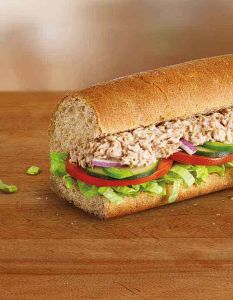I eat at Subway sometimes. I really prefer a big greasy burger with cheese (and maybe chili), but Subway is healthier and they do a good job, so I go there occasionally. I’m aware of their corporate culture’s focus on consistent quality. So, I was really surprised when someone filed a class action against them last week claiming that their tuna sandwiches don’t contain any tuna. Huh?
I’ve been defending food companies in class actions for over 30 years, so right away this struck me as another half-baked case from ambulance chasers. There are a whole bunch of reasons why one of the biggest franchise companies in the world (over 41,500 stores in more than 100 countries) isn’t going to try a Mickey Mouse stunt like selling tuna-less tuna sandwiches. Mickey Mouse, himself, wouldn’t try such a Mickey Mouse scheme. Here are a couple of the less obvious reasons why the plaintiffs are barking up the wrong tree:
- To pull off something like tuna-less tuna sandwiches, you’d need to involve hundreds of people in a conspiracy to formulate, source ingredients, prepare and ship something that contains no tuna, but is labeled “tuna.” That means that there are hundreds of people in your organization, any one of whom can hold you hostage if they get even the slightest bit pissed off. Take Bruno in shipping for example: “Hey, Sally got promoted instead of me. That sucks. I only fell asleep on the job a couple of times. Well, tell-you-what Subway. You better take care of me with some real money or I’ll blow the whistle.” No one who leads a worldwide corporation with more than $10.4 billion in sales is going to put themselves in that position. It’s just too ridiculous.
- It’s too penny ante. If someone leading a multi-billion dollar company is going to steal, they’re going to steal big. If you want to steal with tuna, you engage in price fixing. Bumble Bee, StarKist and Chicken of the Sea conspired to boost the price of canned tuna. Those geniuses got caught and paid hundreds of millions in fines, and Bumble Bee’s CEO wound up in prison. Subway is much smarter than that.
So, what’s going on here? When I defend a case, one of the first things I do is look at who’s opposing me. I went into the court file for this case and saw something really funny. To start a federal lawsuit, you have to file a complaint, a summons and some related paperwork. In this case, the plaintiffs’ attorneys just couldn’t get it right. They filed the summons three times, the complaint twice – – and they were still screwed up. The court clerk sent them a notice saying the case wouldn’t go forward until they filed a statement stating what kind of case they were filing – – something you’re always supposed to do. They filed that statement and were finally permitted to proceed. So, it’s obvious. We’re dealing with some really experienced professionals here – – NOT.
I did a little more digging and came across an interview with one of plaintiffs’ attorneys. He says, and I quote him here, talking about what’s in Subway’s tuna sandwiches: “We are conducting tests to figure out what it is. The lab tests thus far have only told us what it isn’t.” Hmmm. Don’t you think it would be a good idea to figure out what the defendant is actually selling before you accuse a multi-billion dollar multi-national corporation of cheating on tuna sandwiches in Alameda County? I guess not.
The complaint that plaintiffs were finally able to file, after a couple of tries and a notice from the court, has some pretty entertaining stuff in it. Subway’s tuna sandwiches “… are completely bereft of tuna …” Bereft – – there’s a word I don’t see very often in a lawsuit. Maybe this case is actually bereft of legs.
Here’s another one from the complaint: The plaintiff consumers were cheated “… because a reasonable consumer would not have … paid as much for the …” tuna sandwich if (s)he knew it didn’t really contain tuna. Right. I can see myself standing in line at Subway and the person ahead of me at the check stand is arguing with the cashier: “I know this tuna sandwich doesn’t contain tuna. I don’t know what’s actually in it, but I’ll give you $1.25 for it.” Stuff like this finds its way into class actions.
Maybe a single Subway sandwich shop, or a couple of them owned by the same person, is playing funny with the tuna, but the whole chain – – no chance. It’s just too stupid a play for a bunch of smart people to try.
The Food Lawyers® bottom line
What we have here is a failure to think. This lawsuit is being brought on incomplete facts and improbable theories. The plaintiffs have their heads up their tuna and we’re going to find ourselves adding this one to the pantheon of stupid class actions that were just a waste of everyone’s time.

